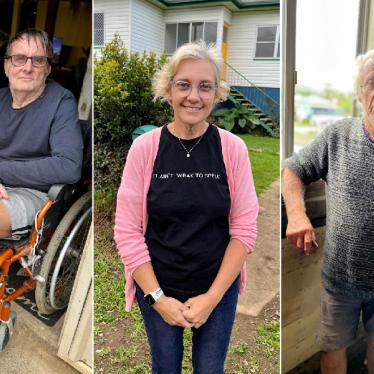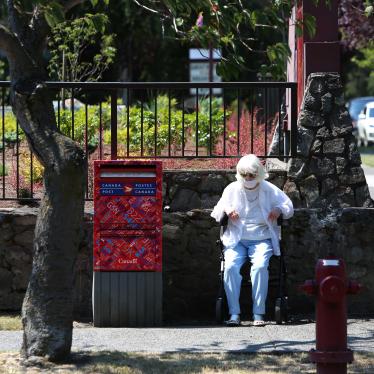April 2023
Introduction
This memorandum, submitted to the United Nations Independent Expert on the enjoyment of all human rights by older persons ahead of its upcoming report to the 78th session of the General Assembly on “older persons in the context of climate change-induced disasters and building back better,” highlights areas of concerns and makes recommendations to the UN Independent Expert.
This submission draws from research conducted from 2021 to 2023 on the impact on older people and people with disabilities of heatwaves in British Columbia, Canada; floods in New South Wales, Australia; floods in northeastern Bangladesh (to be published in June 2023); and heatwaves in Andalusia.
Human Rights Watch research found that in situations of disasters and extreme weather events exacerbated by climate change, older people are at higher risk of death and negative physical and mental health impacts, which are compounded by experiences of poverty and isolation. Yet, governments have not taken sufficient action to ensure their safety, protection, and ability to adapt to climate change. Unless governments commit to rapidly reduce emissions and phase out fossil fuels to prevent the most catastrophic climate outcomes, older people’s lives will be at greater risk.
Right to life
Older people are disproportionally affected in emergency situations and are more likely to die in these contexts. The staggering death rates during the 2021 heatwaves in British Columbia (BC), Canada, illustrates these points: 90 percent of those who died were older people. During the heatwaves in Spain from June to August 2022, government data shows that more than 4,500 people above the age of 65 died due to extreme temperatures, amounting to more than 98 percent of all heat-related mortalities in the country. Due to the lack of data on disability and age, it is often unclear exactly how older people with disabilities are affected by a particular disaster.
Marge Graham, 84, was among four people killed during the flooding in the town of Lismore in New South Wales in Australia on February 28, 2022. A neighbor told Human Rights Watch that Marge died during the flooding, after being trapped in her home as the flood waters rose: “When it was still chest height, I could hear Marge screaming. By the time it was night, and it was up to the doors, I couldn’t hear her anymore. She had a ‘walking frame;’ she couldn’t climb anywhere.”
Human Rights Watch found that the New South Wales and local authorities did not provide adequate flood warnings, evacuation, or rescue support, leaving older people and other at-risk groups to cope with the flooding on their own.
Of those who died in British Columbia, Canada, 90 percent were older people. Human Rights Watch documented that inadequate government support compounded risks for older people and other at-risk populations during the extreme and foreseeable heatwaves. Lack of government support led to unnecessary suffering and deaths.
BC Emergency Health Services did not activate their emergency operations center to coordinate their response until after the heat dome began to subside. News media reported several cases of older people dying during heatwaves while waiting for an ambulance, including Gian Goel, 71, who died while waiting 90 minutes for an ambulance on June 27, 2021, despite living about 10 minutes from a hospital. One woman said her 88-year-old aunt who used a wheelchair died on June 28 after she was unable to get through to emergency services.
Access to protection, assistance, and public services in Bangladesh
Older people interviewed in Bangladesh described a lack of warning systems, protection, and assistance. None of the people interviewed by Human Rights Watch received warnings announced on national television or any other form of communication, leaving many unprepared. The Special Rapporteur on human rights and climate change, Ian Fry, reported that people did not receive warning ahead of the June 2022 floods. While the waters rose swiftly, which exacerbated the problem, the failure of the early warning system meant people were unable to stock up on food and medicine or move to flood shelters or safe areas.
Older people, also, had to often rely on family members to reach safety and to access public services essential for their rights, including food, water, sanitation, and humanitarian aid, which in turn impacts their mental health. “We, the older people, are always a burden for a family,” said Mohammad Abdul Gani, 75. “During the flood you cannot imagine how unbearable the situation was.”
Municipal governments operated some shelters during the 2022 floods in Bangladesh. However, people said that the shelters that were available were overcrowded, not accessible for older people and people with disabilities, and that food was scarce.
Ghani described the conditions in the shelter as “another nightmare”:
There were only two toilets used by 200 to 300 people. As I have cataracts, I cannot see properly, so it was also difficult for me to move around the shelter. My son helped me when he was around, but he had to go and look for food. I also didn’t have access to my medicines while at the shelter since I lost them when my house was flooded.
Moinuddin, 80, has cerebral palsy. He lives with his son, daughter-in-law, and a granddaughter who also has a disability. When the flooding hit their area, the family went to a nearby school where 100 families were already sheltering. Rina Begum, Moinuddin’s daughter-in-law, said:
We could not stay there for more than four days, because it was difficult for me to look after my father-in-law and my daughter. Lots of people were using the same toilet, the floor where we were sleeping was wet and dirty, and there was food scarcity. We got a hot meal only once in the four days we were there.
Right to Health
Extreme weather events can disproportionately impair the physical health of older people – especially those with disabilities and existing health conditions. Social factors, such as limited income and inadequate warnings and information on how to stay safe, exacerbate the risks. Lack of access to medical care during extreme weather events and in the aftermath can put people’s lives and health at higher risk, especially older people who are more likely to need ongoing medical care.
After the floods in northeastern Bangladesh, many of the people with disabilities and older people we interviewed said that during and after the floods, they lacked access to their medication and other medical care. The lack of warning meant that people could not prepare by stocking up sufficient medication. Habibur Rahman, father of a 15-year-old, Habiba, who has cerebral palsy and whose 80-year-old mother died during the flooding since she didn’t have access to the medication she used regularly, said advanced warning would have made a difference:
If only we had been warned that the whole Sylhet would be flooded, we could have at least stocked up on food and mother’s medication. Perhaps my mother would have lived if she had her regular medication during the flooding.
In Canada, older people interviewed by Human Rights Watch in 2021 described symptoms of heat exhaustion and heat-related illnesses during the “heat dome.” They recounted fevers, headaches, dizziness, nausea, confusion, swollen legs, weakness, breathing difficulties, and losing consciousness.
A 69-year-old woman with a physical disability and asthma lived in a subsidized housing unit in South Surrey, British Columbia. She said the temperature in her apartment reached 39 degrees Celsius during the heat dome and that she developed a cough and a persistent fever. “I have never been so sick in my entire life,” she said. “I have had fevers and colds, but not this dizziness, not the shakiness. I couldn’t do anything. I nearly fell off the toilet seat because I was so dizzy.”
Human Rights Watch found that the absence of an effective and timely provincial response, and lack of access to cooling, timely and appropriate health care, compounded the health impacts on older people.
Impacts on Mental Health
Research on climate change and extreme weather events around the world indicates that people living in at-risk areas are at higher risk of negative mental health impacts. The Intergovernmental Panel on Climate Change found that climate change poses a rising threat to mental health and psychosocial well-being, including distress, anxiety, depression, and grief.
In 2021, the Office of High Commissioner for Human Rights reported that older people’s mental health may be disproportionally impacted due to existing isolation, poverty, and because some older people are more reluctant to seek mental health services.
During the British Columbia heatwaves, older people said they were coping with trauma, anxiety, agitation, and depression because of past heatwaves and with the uncertainty of surviving future ones.
Poverty and Isolation
Extreme weather events can exacerbate economic inequality, poverty, and social isolation that already disproportionately affect older people. At the same time, economic and social status plays a huge role in the ability of people to adapt to climate change and to stay safe during extreme weather events.
In Canada, the BC Centre for Disease Control reported that “most deaths occurred in the community in private residences, and the areas of risk had … less green space, more people living alone, and lower income levels.” Most older people and people with disabilities interviewed lived alone, in poverty, and did not have a reliable support system or anyone to check on them in case of an emergency. Lower income areas often have less green space and tree cover. Those interviewed lived in small unit apartments, which made it harder for people to deal with the extreme heat. All but one said they had minimal ventilation and inadequate green space or shade around their buildings.
Targeted support for people with disabilities and older people who cannot afford to buy or operate cooling devices, and for whom access to public cooling centers is not feasible or medically advisable, is critical.
Recommendations
To Governments:
- Ensure that older people, particularly those with lived experience of extreme weather events, are included in all climate change discussions, including mitigation, adaptation, and preparedness planning;
- Develop systems to inform and support older people to adapt to climate change impacts and extreme weather events, in consultation with these groups;
- Ensure access to timely and appropriate health care for older people, including during extreme weather events;
- Ensure that emergency messaging methods and emergency preparedness and response programs are inclusive of and accessible to everyone and developed in consultations with older people, including those with all types of disabilities;
- Ensure that information on climate mitigation and adaptation is available in different formats that are accessible to all older people;
- Collect data on the full scope of extreme weather events, and disaggregate this data by age, disability, ethnicity, and gender, among other relevant categories;
- Comply with existing commitments on climate finance—i.e., financing that seeks to support mitigation and adaptation actions to address climate change—and ensure all actions consider the rights of older people in funding; and
- Rapidly reduce emissions, stop subsidizing fossil fuels, and end all new fossil fuel projects, while engaging the transformation of the economy to be carbon-neutral and rights-aligned, to prevent the most catastrophic climate outcomes and to protect the rights of at-risk populations along socio-economic lines.
To the United Nations, including the United Nations Framework Convention on Climate Change (UNFCCC) Secretariat:
- Ensure the meaningful participation and involvement of older people in climate change negotiations and discussions on an equal basis with others.
To Humanitarian Agencies and Disaster Risk Reduction Groups:
- Ensure inclusive design, planning, targeted funding, and outreach to older people.






